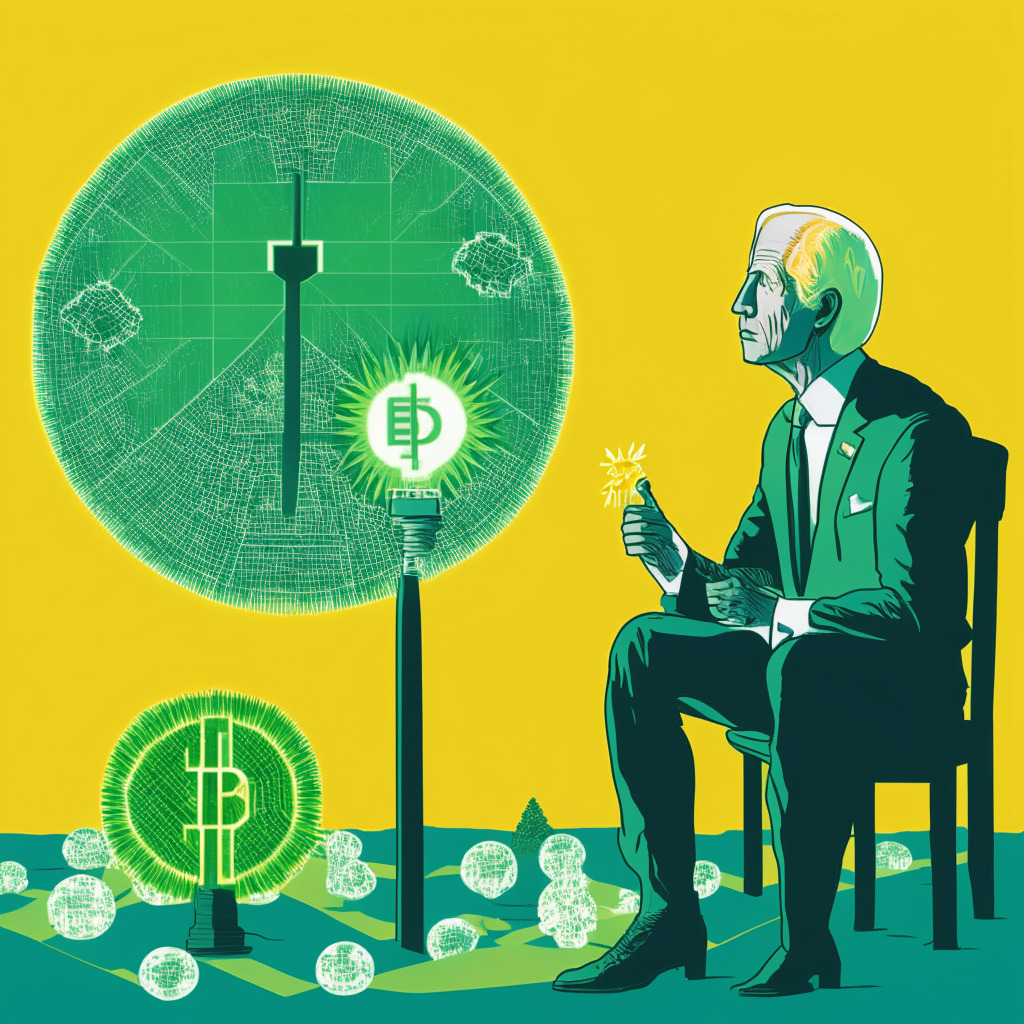Robert F. Kennedy Jr., recently purchased two Bitcoins for each of his seven children, a move triggered by criticisms for advocating Bitcoin without personal stake. He views Bitcoin as a means of defending public rights against government and corporate invasion. However, this action raises questions regarding potential conflict of interest. Despite potential implications, Kennedy continues to publicly endorse Bitcoin.
Search Results for: Robert Kennedy Jr.
Unmasking Robert F. Kennedy Jr.: Journey from Bitcoin Skeptic to Advocate and The Implications
Robert F. Kennedy Jr. recently revealed his membership of the Bitcoin brigade, despite earlier contestations. This change occurred post-attendance at the Miami-based Bitcoin Conference. Kennedy’s decision to purchase and publicly support Bitcoin however, raises questions about potential conflict of interest, especially with regards to future legislation under Kennedy’s potential presidency.
Kennedy’s Bold Crypto Agenda: An Independent Run for Presidency Powered by Bitcoin
“Robert F. Kennedy Jr., a Bitcoin supporter, announced his independent candidacy for presidency. Among his platforms is a positive stance on cryptocurrencies, including campaign finance via Bitcoin, tax exemptions for Bitcoin investors, and potential backing of the U.S. dollar with Bitcoin.”
RFK Jr. Defends Bitcoin Amid Environmental Criticisms: Unveiling A Path To Financial Liberty
Robert F. Kennedy Jr. countered common environmental criticisms of Bitcoin, arguing that such narratives should not limit financial liberty. He concurred with Sangha Systems’ Daniel Feldman who proposed Bitcoin mining could bolster renewable energy production, further improving the electric grid. This divergent perspective also underscores the neglected economic advantages of Bitcoin mining.
Unveiling Politics of Crypto: RFK Jr. Advocates Bitcoin Despite Environmental Controversy
U.S. presidential candidate Robert F. Kennedy Jr. proposes a less alarmist view on Bitcoin’s environmental impact, saying it shouldn’t limit financial freedom. Should he win, he plans to exempt Bitcoin from capital gains tax and shows interest in backing the U.S. dollar with Bitcoin.
Unmasking Kennedy Jr’s Bitcoin Endeavor: A Risky Game or Prudent Trust Investment?
Democratic presidential candidate Robert Kennedy Jr. revealed his significant investment in Bitcoin, contradicting his previous statements. Despite the digital currency’s volatile nature, he has allocated two Bitcoins to each of his seven children. His actions, while risky, indicate his conviction in Bitcoin’s potential. Kennedy’s proposed policies, if elected, could significantly impact Bitcoin’s role in supporting the U.S. dollar and its tax implications. With his investment valued around $410,000, the tale of Kennedy’s Bitcoin journey is a narrative of trust, risk, and anticipation.
US Elections: Kennedy’s Pro-Crypto Stance Stokes Capital Gains Tax Debate
“US Democratic presidential hopeful Robert F. Kennedy Jr. has recently committed to exempt digital currencies from capital gains tax when converted to USD. He claims this will incentivize investment, boost crypto businesses domestically and enhance citizen privacy. Critics warn that this could also open up a Pandora’s Box of risks, including financial instability and abuse of these platforms for illicit activities.”
Unpacking Kennedy’s Bold Bitcoin Backing Proposal: Economic Boon or Bane?
Robert F. Kennedy Jr., a presidential candidate, controversially proposes to back the US dollar with Bitcoin to strengthen the economy and curb inflation. Skeptics voice concerns over Bitcoin’s volatility and potential issues of economic inequality resulting from proposed tax exemptions on Bitcoin-to-dollar conversions.
Elon Musk and RFK Jr. Dodge Crypto Talk, Focus on AI and US Dollar Concerns
Elon Musk and Robert F. Kennedy Jr discussed AI, social media censorship, and COVID misinformation but avoided Bitcoin and digital assets in their conversation. While the digital currency market remains crucial, AI and information handling demand equal attention in our technology-driven world.
Dorsey Backs Pro-Crypto Kennedy for 2024 Presidency: Blockchain Future vs Vaccine Skepticism
Twitter co-founder Jack Dorsey endorses pro-crypto presidential candidate Robert F. Kennedy, Jr. for the 2024 elections. Kennedy aims to protect individual rights to hold and use Bitcoin, resist government intrusion, and end the corrupt merger of state and corporate power.
Crypto in Politics: Jack Dorsey Backs Pro-Bitcoin Presidential Candidate RFK Jr.
Twitter CEO Jack Dorsey supports pro-crypto Democrat candidate Robert F. Kennedy Jr., who accepts Bitcoin donations for his presidential campaign. Kennedy criticizes CBDCs as tools to suffocate dissent and condemns a proposed 30% tax on crypto mining.
Elon Musk Invites Pro-Bitcoin Candidate RFK Jr. to Twitter Spaces: A Crypto-Politics Collision
Elon Musk invites 2024 presidential candidate and Bitcoin supporter Robert F. Kennedy Jr. for a Twitter Spaces interview, raising intrigue on crypto and politics discussions. Kennedy’s opposition to CBDCs and concerns over government control align with Musk’s crypto affinities.
RFK Jr.’s Bitcoin Campaign Donations: Innovation or Recklessness?
Democratic presidential candidate Robert F. Kennedy Jr. announces plans to accept Bitcoin campaign donations, addressing issues like Bitcoin’s classification as a security and considering pardoning individuals like Ross Ulbricht. His pro-cryptocurrency stance highlights trust in blockchain’s future but raises concerns about transparency and regulation.
RFK Jr.’s Bitcoin Campaign Donations: Breaking Barriers or Courting Controversy?
Democratic presidential candidate Robert F. Kennedy Jr. announces he will be the first to accept Bitcoin campaign donations, emphasizing its link to democracy and freedom. Critics argue potential drawbacks include lack of regulation, anonymity, and market instability affecting donation value.
Stagnation Strikes: Fed Rate Hikes, Alleged Token Manipulation, and Kennedy’s Crypto Conspiracy
This week in crypto: Stagnation due to the Fed’s interest rate hike, Binance’s “CZ” Zhao flags Tron CEO’s suspicious token transfer, crypto-based conspiracies from 2024 Presidential hopeful, reports of Amazon’s possible NFT marketplace launch, and El Salvador incentivizes tech innovation.
RFK Jr. Challenges Biden’s Crypto Stance: Privacy, Taxation, and CBDC Concerns Unveiled
Robert F. Kennedy Jr. criticizes President Biden’s 30% tax on crypto mining and expresses concerns over government control on bank accounts and payment platforms. He opposes central bank digital currencies, arguing they could be used to subdue dissent by cutting off access to funds.
Economic Mega-Crisis: Kennedy Challenges Biden, Debates Cryptocurrency & Banking Collapse
Robert F. Kennedy Jr. warns of an impending economic “mega-crisis,” calling for urgent attention to rebuild the economy as job openings plummet and inflation hits the middle and working class. Kennedy criticizes President Biden’s proposed Digital Asset Mining Energy (DAME) excise tax, asserting the importance of cryptocurrencies in driving innovation and maintaining financial freedom.
2024 Presidential Race: RFK Jr.’s Impact on Crypto Policy and CBDC Debate
2024 presidential race candidate Robert F. Kennedy Jr. criticizes the Biden Administration’s proposal for a 30% tax on cryptocurrency mining, arguing it hinders industry growth and stifles innovation. Kennedy also accuses U.S. financial regulators of waging “an extra-legal war on crypto” and opposes Central Bank Digital Currencies as mechanisms for social surveillance and control.
Cryptocurrency in the Political Arena: Impact on the US Presidential Race
The upcoming US presidential race sees prominent “crypto candidate” Ron DeSantis in competition with other pro-crypto candidates. Amid this, the potential influence of Donald Trump’s crypto assets for 2024 raises intriguing questions for the future of cryptocurrency in the US.
Grayscale Court Victory: A Landmark for US Crypto Industry or SEC Overreach?
Republican Presidential candidate Vivek Ramaswamy perceives Grayscale Investments’ recent courtroom victory over the SEC as a critical defense for blockchain and Bitcoin innovation in the U.S. He plans to rollback federal regulations that hinder the growth of crypto markets if they don’t meet Supreme Court tests, while criticizing the contentious approach of regulation by enforcement preferred by the SEC.
Crypto Wars: Democrats Risk Alienating Youth Voters with Anti-Crypto Stance
Crypto billionaire Cameron Winklevoss warns that the war on cryptocurrencies led by U.S. Senator Elizabeth Warren and SEC Head Gary Gensler could alienate Millennials and Gen Z, potentially impacting Democratic voter support. Not all Democrats share anti-crypto sentiment, as the debate around regulations continues to shape the political landscape.
FedNow and Metal Blockchain Integration: Stablecoins, Privacy, and Financial Future Debated
The Federal Reserve’s upcoming integration with Metal Blockchain has sparked debates on stablecoins, privacy, and financial system plans. Metal Blockchain’s collaboration with instant payment service FedNow aims to enable rapid stablecoin conversions and potentially create interconnected “bank chains” for a secure, oracle-independent blockchain ecosystem.
Balancing CBDC Progress: Privacy Concerns vs. Blockchain Innovation and Financial Inclusion
North Carolina’s House of Representatives unanimously voted in favor of a bill prohibiting state’s government entities from accepting CBDCs, raising questions on embracing or restricting such currencies. CBDCs face debates on privacy, governmental control, and improved transaction speed, financial inclusion, and security compared to decentralized cryptocurrencies.
Florida’s Anti-CBDC Law: Protecting Privacy or Hindering Progress? Debating Pros and Cons
Florida’s anti-CBDC legislation, SB 7054, explicitly prohibits the use of central bank digital currencies as a digital medium of exchange, aiming to protect Floridians’ financial privacy. Set to come into effect on July 1, 2023, this legislation highlights growing concerns over potential privacy and political repercussions linked to CBDCs.
Crucial Crypto Updates: The Bitcoin Slump, Crypto Aid Israel and The Rise of BitVM
Bitcoin’s value hovers at $27,653 as Robert F. Kennedy Jr, a crypto enthusiast, vies for presidency as an independent, proposing the reinforcement of the US dollar with Bitcoin among other assets. Cryptocurrency organizations, including Fireblocks, offer aid in the midst of the Israel crisis, suggesting possible integration of crypto in traditional finance systems. Robin Linus unveils BitVM, potentially importing Ethereum-level smart contracts to the Bitcoin sphere.
RFK Jr’s Pro-Crypto Presidential Run: Redefining America’s Financial Future and Political Landscape
Robert F. Kennedy Jr., running as an independent candidate in the upcoming U.S. Presidential Race, is adopting a pro-cryptocurrency stance. Aiming to make America a global hub for cryptocurrency, particularly Bitcoin, Kennedy proposes backing the USD with hard currencies, including Bitcoin. This move could fundamentally transform America’s position in the global crypto landscape and the fate of Bitcoin.
Binance’s Stablecoin Delisting: A Regulatory Avalanche or Necessary Compliance Step?
“Binance plans to delist all stablecoins from its European platform by June 2024, complying with Europe’s tight regulation. The move, following the passing of Europe’s crypto regulation law, MiCA, could significantly impact the European crypto market. Meanwhile, the U.S. grapples with its digital currency dilemma, revealing distinct attitudes towards financial digitization.”
US Central Bank Digital Currency: Speed of Transaction vs Privacy Concerns
“The United States House Financial Services Committee is considering further restrictions on a central bank digital currency (CBDC). Critics argue that a CBDC would centralize control, contradicting the philosophy behind cryptocurrency, and posing potential privacy risks. Despite some progress, the future of a U.S. CBDC remains uncertain.”
CBDC Anti-Surveillance State Act: Preserving Financial Privacy in the Age of Digital Currencies
U.S. Representative Tom Emmer, with the support of 49 other Republican representatives, reintroduced the CBDC Anti-Surveillance State Act to prevent unjust financial surveillance through retail central bank digital currencies (CBDCs). Advocates contend such government-sanctioned currency must respect financial privacy, individual freedom, and market competitiveness.
Navigating Crypto Regulations: The CBDC Anti-Surveillance State Act and the Privacy Debate
“Regulation of cryptocurrencies and the blockchain technology is a pressing topic, with concerns about privacy and government surveillance. The ‘CBDC Anti-Surveillance State Act’, reintroduced by Rep. Tom Emmer, aims to limit unelected authorities in issuing a central bank digital currency (CBDC), fearing it could be used as surveillance resources.”
Shaping Elections 2024: How Cryptocurrency Could Swing the Political Pendulum
“Crypto guru, Brian Armstrong, predicts that the exploding interest in crypto will turn it into a defining issue in the 2024 elections. As 56 million Americans already operate with digital currency, its potential implications are engaging presidential candidates. However, the quest for clear crypto regulation still looms, with opportunities for legislative clarity potentially arising from the Securities and Exchange Commission.”
Exploring the Political Spectrum: The Rising Influence of Bitcoin Mining and Cryptocurrencies
Senator Ted Cruz endorses Bitcoin, highlighting its potential in bolstering energy grid resilience—an advantage in emergencies, such as the recent Texas extreme weather. The stance reflects the growing influence of digital currencies, despite potential hurdles and economic turbulence.































